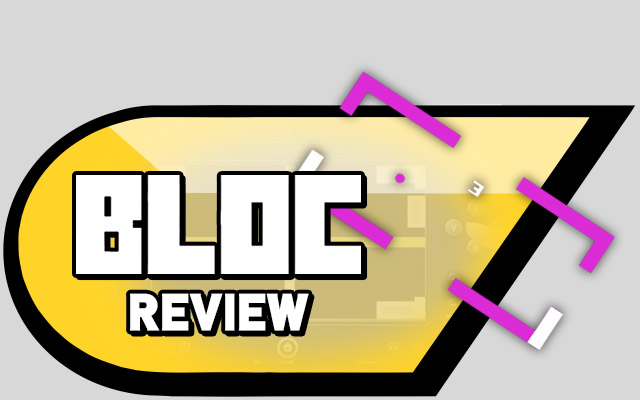This review is possible thanks to Cragworks, who provided Source Gaming with a review copy.
Developed by Calvin Tham and Perry Burkum, Bloc is a new indie game for Wii U. It’s very much in the spirit of independent game development, with seemingly only two developers and a release entirely sans fanfare. Inspired by arcade classics like Pong and Breakout, it’s meant as an interesting take on Wii U local multiplayer but struggles to put forth its ideas in a way most conducive to their potential.
Just for clarity’s sake, this game is entirely unrelated to the Cold War-era MMORPG.
Story
Well, there’s little of that to be found here. Bloc is about as bare bones a game as one’s likely to find, and all mechanics oriented. I quite like how focused it is in this case, but it’s not exactly pushing narrative or even a lack of narrative boundaries.
Gameplay
It really cannot be emphasized enough that Bloc is small, though that is not inherently bad by any means. Like Affordable Space Adventures, it finds its inspiration in the blocky, large design of the GamePad, but to an even more extreme extent. The entire game uses the GamePad, with the joysticks, D-pad, and A, B, X, and Y buttons each being used as equivalent control schemes.
Bloc is for all intents and purposes a Pong clone, though it does have far more of a unique identity than that sounds. There is either a purple ball or a yellow star that drops from the center of the screen, and players – who control four moveable paddles on the edges of the screen at the same time – try to keep it from falling out of the screen. There are also bumpers that change color when touched by the object, and the game tallies up the score to push you to do better. That’s it, really. The number of unique scenarios are rather small and don’t change much, and the limited possibilities mean that the game runs out of tricks quickly.
Controls are the most interesting thing here, essentially a one-person co-op game when playing alone. You can quickly adjust controls in the menu just by tapping the paddles, allowing you to move any combination of them with any one of the control schemes. It’s an enjoyably madcap and open approach to controls in games, far more expansive than most console titled I’ve played. Unfortunately, the game is still so limited – I mean, it’s Pong – that the myriad of possibilities from that setup go unused.
This also comes into place in the game’s multiplayer element, selectable by nothing more than pressing an “OFF” button on the interactive menu screen, which also allows you to see controls, adjust the ball speed, and turn off the music (the game’s commitment to simplicity in this regard is satisfying). Giving you one of a few randomized layouts with different obstacles, players try to move their Blocs to hit the ball and keep it out of the death zones. But this is where the specter of its inspiration is most affecting (and negative), as Pong was never meant as a game demanding significant elaboration. The small arena and limited movement of the paddles means that this is an anarchic sport on a placid system, and the thrill of hitting the ball is reduced with the resignation that it’s just going to inevitably fall into a corner pocket in about a second. This is fine enough for single player, but in multiplayer it’s more irritating than spirited.
Presentation
For the issues I have with the game, this is where Bloc shines brightest. Many indie games deliberately ape retro graphics and audio, but this is an odd case of trying to hit at a spirit of arcade games instead of the strict 8-bit art. The stark black background is reminiscent of Pac-Man and Donkey Kong, and Burkum’s ear-wormy single music piece is catchy. The bold purple and yellows feel close to, but distinct from, the reds and blues of older equivalents. There isn’t much to this, but there isn’t much to the game as a whole, and the stylistic choices you get here are satisfying.
Verdict
While I don’t think Bloc was misguided and has a genuinely interesting core with its customizable controls, it’s sadly far too limited in what it can do to feel like much more than an interesting experiment. I played it with two friends and we agreed that while it’s definitely interesting conceptually and could lead to something rather fun, as it is, it’s really more of a light diversion. That’s acceptable for its $2.99 eShop cost and would probably be enjoyable to bring out as a party game for a couple minutes, but beyond that, it is fairly bereft of much else. But I can’t dislike it and hope that the simplicity of these control schemes could be taken as inspiration. The idea of a game being so customizable, so open for local multiplayer, is still exciting, and hopefully Bloc will prelude or even inspire more games like it.
Final Verdict:
- Indie World April 17, 2024: Information and Reactions - April 17, 2024
- Gun Metal Gaming Chapter 3: Second Acts in Gaming Lives - March 30, 2024
- Gun Metal Gaming Chapter 2: Grand Theft Auto: Dionysian Simulator - February 27, 2024










You hit what I was trying to do with the controls and art. Amazing redo of the logo by the way. I appreciate the in depth analysis and agree this kind of control customization is the highlight of the experience.